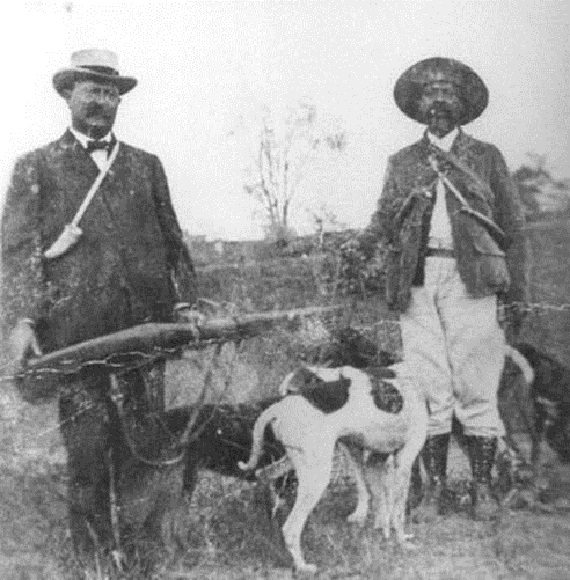Most people have never heard of Holt Collier – and those who have heard of the “Teddy Bear” may be surprised to learn about his history.
Collier was born into slavery in Mississippi in 1848. By his 15th birthday, he had become an expert on wildlife in the Mississippi Delta and was known as one to of the best bear hunters in the American southeast.
Freed, prior to the war between North and South, Collier wanted to join up to serve the Confederacy. He was originally turned down for due to his age, but he was accepted in the 9th Texas Brigade. His service was honorable and would conclude as a trusted aide and sharpshooter under Confederate Lt. Gen. Nathan Bedford Forrest.
After the war, his fame would grow. He claimed he had killed 3,000 bears and he was the “guide of choice…in those days, leading hunts for a Who’s Who of prominent men from around the country. Once, when an angry black bear cornered one of his prized dogs inside a hollowed log, Collier climbed in. As the bear tried to crawl past Collier and escape from the log, Collier stabbed it with his knife, killing the bear. Collier suffered only minor scratches,” according to “Camp Smoke”.
Men would travel miles to hunt with him as if they were learning from the very man who invented the art. In 1902, Holt received a request from none other than U.S. President Teddy Roosevelt.
“I got things ready; found a beautiful campin’ place. I was boss of the hunt. Along came the President with a car-load of guards, but he left all but one of ‘em in the car. Anyway he was safer with me than with all the policemen in Washington. The President was a pleasant man; when he was talking he’d stop every little while to ask other people’s opinion,” Holt later recalled.
Originally scheduled to be a 10 day hunt, Roosevelt didn’t want to wait over a week to see a live bear…he wanted one the first day.
Collier delivered the bear…’popped out of the gap’ where’ promised…but the “Colonel” and his party had adjourned from the blind to have lunch.
Frustrated, Collier, exhausted from his efforts fleshing out the bear, decided he but take more aggressive steps to bring the bear to the Colonel. He challenged the bear, but unfortunately, Jocko, Collier’s favorite hunting dog was in the bear’s clutches.
Collier saved him by clubbing the bear with his rifle, and after a fight, he subdued the bear, threw a lasso over it’s neck and tied it to a willow tree.
Collier would summon President Roosevelt to show him the bear he’d missed earlier and to put it out of his misery. Some in the party including railroad baron Stuyvesant Fish, and Mississippi Governor Andrew Longino cheered the leader of the free world to shoot the bear.
“But Roosevelt, ever the skilled politician, knew that reporters were back in camp would have a field day with the story. His hunting had been criticized by many East Coast intellectuals and he knew the press’ judgment would be harsh. Roosevelt also knew the laws of the hunt and practiced good sportsmanship in the field. It was an injured animal and there would be nothing sporting about the kill. Roosevelt declined the shot, but ordered the bear put down to end its suffering,” according to Camp Smoke.
But the greatest and longest lasting memory of this trip was the PR blitz that hit the nation when President Roosevelt refused to kill the bear that Holt rounded up for him. Most reports advertised the bear as a cub, when in actuality it was full grown. Although the animal was later put down, Teddy Roosevelt’s refusal was viewed as a noble act in the media and ‘Teddy’ Bears were the hottest item purchased throughout the nation.
Once he returned to Washington, Roosevelt sent Collier a Winchester rifle like the one he used on the trip. It would become one of Collier’s favorites.
Collier would die in Mississippi 1936 at the age of 90, the year Teddy Roosevelt’s 5th cousin, Franklin Roosevelt was running for re-election for president.
Collier makes the pages of American history as one of the most respected outdoorsman in the nation…despite the color of his skin….with an interesting connection to a much loved toy of millions of American children, and a Confederate Veteran. As America observes Black History Month, let’s make sure they remember Black Southern History.







